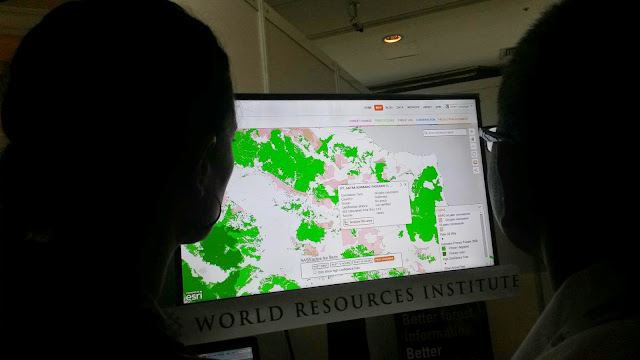RSPO RT12: at the exhibit - online information (update 1)
21 November 2014:
ZSL rating of palm oil companies
Ranking the world's best - and worst - palm oil companies in terms of sustainability by mongabay.com; November 20, 2014; http://news.mongabay.com/2014/1120-palm-oil-sustainability-rankings.html#sthash.GU8j77hn.dpuf

Most companies however don't move on their own—they are pushed, often by consumer-focused campaigns led by environmental groups, which leverage corporations’ sensitivity to criticism. The results since 2006 have been nothing short of astounding: dozens of the world's largest buyers and sellers of soy, palm oil, cattle, and wood pulp have established policies committing them to excluding deforestation—and social conflict—from their supply chains. The biggest coup came last month when Cargill, which sells $135 billion worth of commodities a year, committed to zero deforestation across all its supply chains.... At the highest level, satellite imagery is widely available and is increasingly incorporated into monitoring systems. For example, the Brazilian government and the Roundtable on Sustainable Palm Oil (RSPO), an eco-certification body, are now requiring "shape files" that detail the coordinates of landholdings. This data can be used to determine compliance with environmental regulations and standards.... Satellite data is also integrated into platforms developed by civil society. The best example is Global Forest Watch, a project led by World Resources Institute that takes data from a range of sources and puts it on a map, providing unprecedented insight into the state of the world's forests, including tree cover gain and loss, forestry concessions, and fire history. Its integration of bi-monthly MODIS data provided by NASA enables the platform to serve as a near-real-time deforestation detection system, similar to that implemented by Brazil about the time its deforestation rate began to plunge dramatically in the mid-2000s. A study published last year by the Climate Policy Initiative attributed three-fifths of that decline to Brazil's monitoring system. Now that functionality is global...." http://news.mongabay.com/2014/1114-reasons-to-be-optimistic-about-rainforests.html#sthash.s4Jk57kp.dpuf
Ranking the world's best - and worst - palm oil companies in terms of sustainability by mongabay.com; November 20, 2014; http://news.mongabay.com/2014/1120-palm-oil-sustainability-rankings.html#sthash.GU8j77hn.dpuf
18 November 2014:
WRI's Global Forest Watch
We stopped by the exhibition stand of World Resources Institute. They have good online data mapping info to show on issues related to palm oil and environmental issues such as deforestation, fire and peat.

see more at: commodities.globalforestwatch.org
Here's some excerpts from write-up by Mongabay.com on deforestation and transparency:
Surprising reasons to be optimistic about saving forests by Rhett A. Butler, mongabay.com
November 14, 2014; Note: this is the first draft of a commentary I submitted to Yale Environment 360 last month. A final first-person version is available at A Conservationist Sees Signs of Hope for World’s Rainforests; "....Tropical forest loss has remained at stubbornly high since the 1990s, declining from an average of 11.3 million hectares during the decade to roughly 9.3 million hectares per year between 2009 and 2012. Ranking at the top during both periods were the usual suspects: Brazil and Indonesia, both of which have extensive forest cover and surging agribusiness sectors.... But hidden in these high level numbers is a trend that holds important implications for efforts to conserve the world's forests. Today forests are more often cleared to produce commodities for consumption in urban markets and for trade, rather than for subsistence by poor slash-and-burn farmers. In other words, the tropics are shifting from poverty-driven to profit-driven deforestation.
Most companies however don't move on their own—they are pushed, often by consumer-focused campaigns led by environmental groups, which leverage corporations’ sensitivity to criticism. The results since 2006 have been nothing short of astounding: dozens of the world's largest buyers and sellers of soy, palm oil, cattle, and wood pulp have established policies committing them to excluding deforestation—and social conflict—from their supply chains. The biggest coup came last month when Cargill, which sells $135 billion worth of commodities a year, committed to zero deforestation across all its supply chains.... At the highest level, satellite imagery is widely available and is increasingly incorporated into monitoring systems. For example, the Brazilian government and the Roundtable on Sustainable Palm Oil (RSPO), an eco-certification body, are now requiring "shape files" that detail the coordinates of landholdings. This data can be used to determine compliance with environmental regulations and standards.... Satellite data is also integrated into platforms developed by civil society. The best example is Global Forest Watch, a project led by World Resources Institute that takes data from a range of sources and puts it on a map, providing unprecedented insight into the state of the world's forests, including tree cover gain and loss, forestry concessions, and fire history. Its integration of bi-monthly MODIS data provided by NASA enables the platform to serve as a near-real-time deforestation detection system, similar to that implemented by Brazil about the time its deforestation rate began to plunge dramatically in the mid-2000s. A study published last year by the Climate Policy Initiative attributed three-fifths of that decline to Brazil's monitoring system. Now that functionality is global...." http://news.mongabay.com/2014/1114-reasons-to-be-optimistic-about-rainforests.html#sthash.s4Jk57kp.dpuf